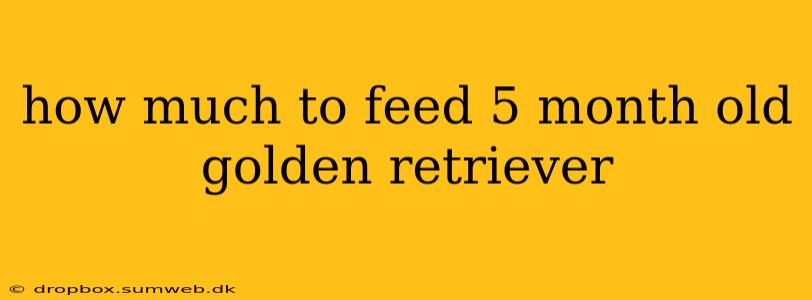How Much to Feed a 5-Month-Old Golden Retriever: A Comprehensive Guide
Determining the right food amount for your 5-month-old Golden Retriever is crucial for their healthy growth and development. Overfeeding can lead to obesity and joint problems, while underfeeding can stunt growth and cause health issues. This guide provides a detailed breakdown to help you find the perfect feeding plan.
Understanding Your Golden Retriever's Nutritional Needs:
At 5 months old, your Golden Retriever is still a puppy, experiencing rapid growth and development. They require a diet rich in protein, healthy fats, and essential nutrients to support this growth spurt. The specific needs will vary slightly based on factors like:
- Breed: Golden Retrievers are a large breed, requiring careful attention to avoid overfeeding and potential skeletal issues.
- Activity Level: A highly active puppy will need more calories than a less active one.
- Metabolism: Some puppies simply have faster metabolisms than others.
- Body Condition: Regularly assess your puppy's body condition. You should be able to feel their ribs easily, but not see them prominently.
Feeding Guidelines:
There's no single magic number for how much to feed a 5-month-old Golden Retriever. The best approach is to use a combination of the food package guidelines and your puppy's individual needs.
1. Check the Food Package:
Most puppy food bags provide feeding guidelines based on weight. Find your puppy's current weight and use the chart provided. However, remember these are just guidelines – use them as a starting point.
2. Monitor Your Puppy's Weight and Body Condition:
Weigh your puppy weekly. If they're gaining weight too rapidly, reduce the food amount slightly. If they seem too thin, gradually increase it. Regularly check their body condition by feeling their ribs.
3. Divide Daily Food into Multiple Meals:
Five-month-old puppies benefit from multiple smaller meals throughout the day. Instead of one large meal, divide the daily amount into 2-3 smaller portions. This helps with digestion and prevents overeating.
4. Consider High-Quality Puppy Food:
Choose a high-quality puppy food formulated specifically for large breeds. Look for brands that list high-quality protein sources (like chicken, lamb, or fish) as the primary ingredient. Avoid fillers and artificial ingredients.
5. Consult Your Veterinarian:
Your veterinarian is the best resource for personalized advice on feeding your Golden Retriever puppy. They can assess your puppy's individual health, growth, and activity level to provide accurate recommendations.
Signs of Overfeeding:
- Rapid weight gain: Significant weight increase in a short period.
- Obesity: Visible excess fat around the ribs, abdomen, and back.
- Lethargy: Lack of energy and decreased activity levels.
- Joint problems: Limping or stiffness, particularly in the legs.
Signs of Underfeeding:
- Weight loss: Noticeable decrease in weight.
- Poor coat condition: Dull, dry, or brittle fur.
- Lethargy: Lack of energy and decreased activity levels.
- Slow growth: Puppy is not growing at the expected rate.
Conclusion:
Feeding your 5-month-old Golden Retriever the right amount is a balancing act. Use the food package guidelines as a starting point, closely monitor their weight and body condition, and don't hesitate to consult your veterinarian for personalized advice. Consistent monitoring and a high-quality diet will ensure your Golden Retriever puppy grows into a healthy and happy adult.

